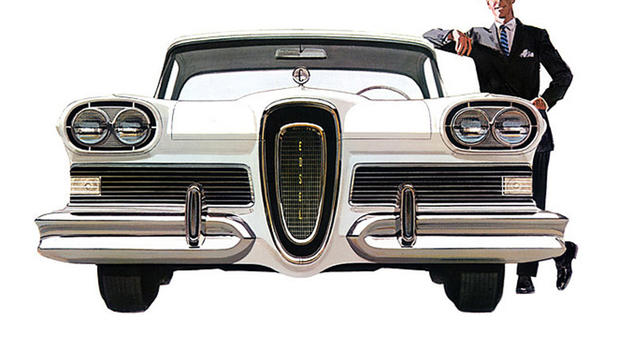Analyzing products of the future that flopped
(CBS News) Remember how the Segway was supposed to save us countless steps, and change everything? As Dean Reynolds reminds us, the occasional fiasco has cluttered our road to the future:
"It's as intuitive as walking!"
Ah, yes, the Segway. It promised a revolution, but it never quite got on a roll.
"The Segway was supposed to change transportation forever," said Jonah Berger, a professor of marketing at Wharton Business School. "We would all be riding around on these little motorized scooters. And it very quickly became a joke -- the end of a bad joke rather than the future."
Berger says the Segway is part of a long, dubious American tradition: the flop. It comes in all shapes and sizes -- you never know when the next new thing is about to take off . . . or not.
The Ford Edsel of the 1950s gave everybody a good laugh . . . unless you owned one.
"People would talk about getting a car with different pieces missing that they'd have to go back and then get them replaced," Berger said.
A few decades later, New Coke went flat. "A lot of the next big things never end up being as big or as next as we hope they're going to be," he laughed.
Inside the New Product Works in Ann Arbor, Mich., on shelves groaning with all manner of stuff, you can find a guide to what works -- and what doesn't.
Their collection of 120,000 individual products includes major categories (food, pet food, beverages, health and beauty), broken down into 350 different sub-categories.
Items there are not for sale, they're for study. This collection of products belongs to a market research company called GfK. And as head of innovation, it's Elliott Rossen's job to help companies discern fad from the fizzle.
"When companies come out with new products, they're often thinking, 'How can we change the world?' 'How can we change people's lives and the way they work?'" Rossen said.
Rossen says that fewer than 20 percent of new products succeed ... and the other 870 percent probably shouldn't. Take the Toaster Egg:
"Actually kind of a hockey puck of egg," Rossen said, "which is made of all sorts of materials, including eggs. Not exactly the most appetizing thing."
The question about bald guys' head wipes kind of answers itself.
"What percentage of us really need something special to keep our head looking not quite as shiny, and clear and fresh?" he asked.
How about Pepsi . . . for breakfast? "Pepsi has done a lot of brilliant things in their advertising and new products, but [Pepsi A.M.] was not one of them," Rossen said.
There are success stories here. The Swiffer swept away the competition and sweeps in a half-billion dollars in annual sales.
Jonah Berger, who wrote a book on why some things catch on, says the answer is simple: When we see others using a product, we tend to want to use it, too.
"We found actually if your neighbor buys a car, you're much more likely to end up buying a car, even if you don't necessarily need one," Berger told Cowan.
And when you come right down to it, even flops serve a purpose.
"If there were no product flops, what would late-night comedians talk about?" Berger asked. "There will always be flops -- and there will always be funny flops."
Sure, flops are funny -- except if the joke's on you!
For more info:
- jonahberger.com
- The Wharton School at the University of Pennsylvania
- "Contagious: Why Things Catch On" by Jonah Berger (Simon & Schuster); also available in Audio download | eBook | CD
- New Product Works at GfK Group, Ann Arbor, Mich.



